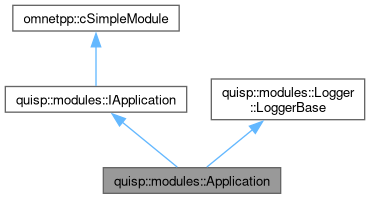Application.
More...
#include <Application.cc>
◆ Application()
| quisp::modules::Application::Application |
( |
| ) |
|
◆ ~Application()
| quisp::modules::Application::~Application |
( |
| ) |
|
|
inline |
◆ createConnectionSetupRequest()
| ConnectionSetupRequest * quisp::modules::Application::createConnectionSetupRequest |
( |
int | dest_addr, |
|
|
int | num_of_required_resources ) |
|
protected |
Generate connection setup response packet.
- Parameters
-
| dest_addr | Destination address of this request |
◆ createEndNodeWeightMap()
| void quisp::modules::Application::createEndNodeWeightMap |
( |
| ) |
|
|
protected |
Store communicatable EndNode addresses and their mass parameters.
◆ generateTraffic()
| void quisp::modules::Application::generateTraffic |
( |
| ) |
|
|
protected |
◆ handleMessage()
| void quisp::modules::Application::handleMessage |
( |
cMessage * | msg | ) |
|
|
overrideprotected |
Message handler.
- Parameters
-
◆ initialize()
| void quisp::modules::Application::initialize |
( |
| ) |
|
|
overrideprotected |
Initialize module.
If the node type is not EndNode, this module is automatically deleted in this function.
◆ end_node_weight_map
| std::unordered_map<int, int> quisp::modules::Application::end_node_weight_map |
|
protected |
◆ generateTrafficMsg
| cMessage* quisp::modules::Application::generateTrafficMsg |
|
private |
◆ id
| int quisp::modules::Application::id |
|
protected |
Application id, which can be used if a user tried to simulate multiple applications on a single network
◆ is_initiator
| bool quisp::modules::Application::is_initiator |
|
protected |
◆ my_address
| int quisp::modules::Application::my_address |
|
protected |
◆ provider
The documentation for this class was generated from the following files:


 Public Member Functions inherited from quisp::modules::IApplication
Public Member Functions inherited from quisp::modules::IApplication Public Member Functions inherited from quisp::modules::Logger::LoggerBase
Public Member Functions inherited from quisp::modules::Logger::LoggerBase Protected Attributes inherited from quisp::modules::Logger::LoggerBase
Protected Attributes inherited from quisp::modules::Logger::LoggerBase